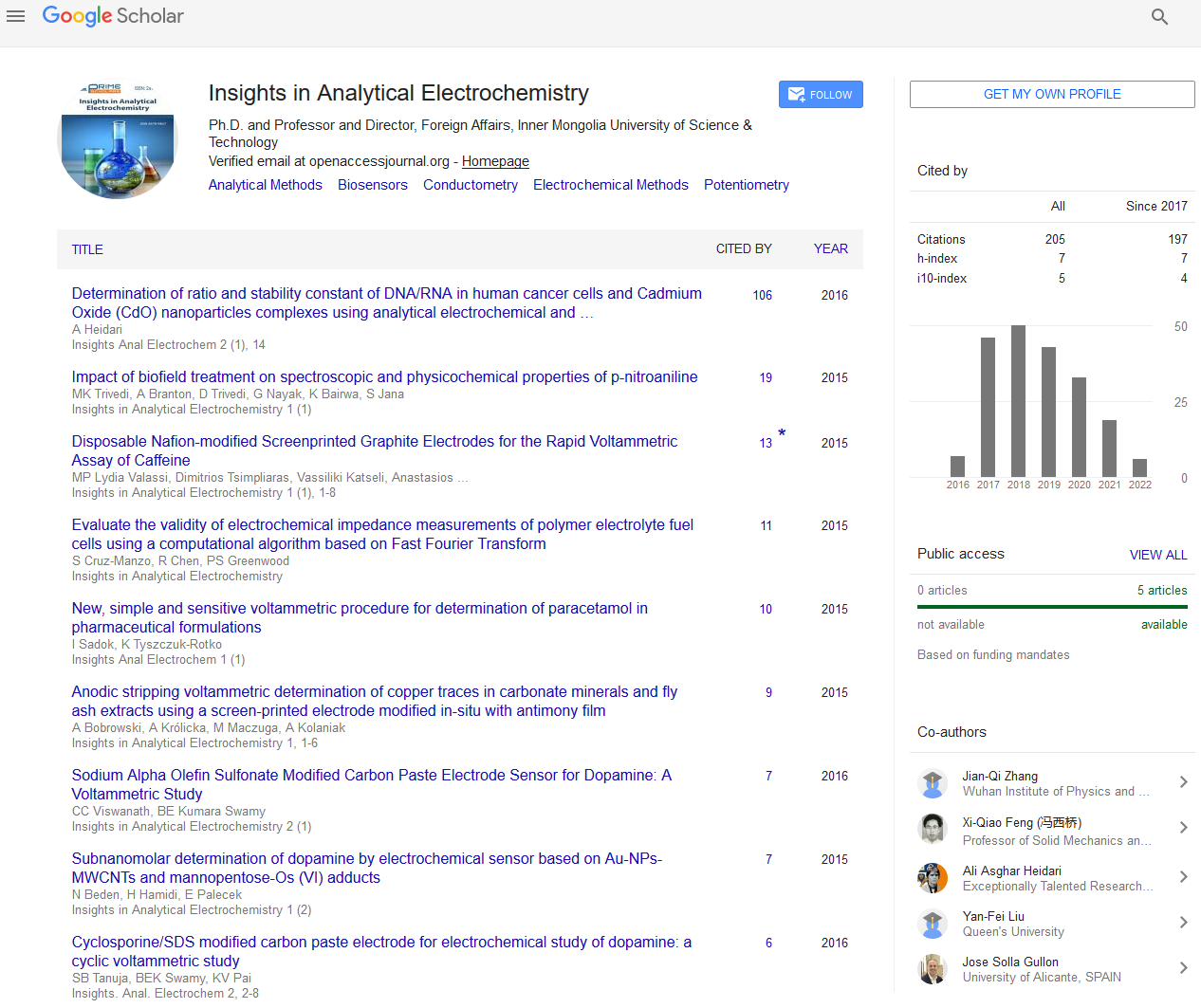Short Communication - (2023) Volume 9, Issue 3
Unveiling Insights: The Crucial Role of Analytical Methods in Modern Research
Justin Benesch*
Department of Chemistry, Ulsan National Institute of Science and Technology University, Republic of Korea
*Correspondence:
Justin Benesch,
Department of Chemistry, Ulsan National Institute of Science and Technology University,
Republic of Korea,
Email:
Received: 30-Aug-2023, Manuscript No. ipaei-23-18173;
Editor assigned: 01-Sep-2023, Pre QC No. ipaei-23-18173 (PQ);
Reviewed: 15-Sep-2023, QC No. ipaei-23-18173;
Revised: 20-Sep-2023, Manuscript No. ipaei-23-18173 (R);
Published:
27-Sep-2023, DOI: 10.21767/2470-9867-9.3.21
Introduction
In the dynamic landscape of scientific research, analytical
methods stand as the unsung heroes, enabling researchers to
delve into the intricacies of various disciplines. These methods
serve as the backbone for extracting valuable insights, unraveling
complexities, and validating hypotheses. In this article,
we explore the significance of analytical methods in modern
research, shedding light on their pivotal role and impact across
diverse scientific domains.
Analytical methods are the bedrock of precise measurement in
scientific investigations. Whether in chemistry, biology, physics,
or environmental science, the accuracy of data is paramount.
Techniques such as chromatography, spectroscopy, and mass
spectrometry play a pivotal role in ensuring that researchers
obtain reliable and reproducible results. These methods empower
scientists to quantify substances down to minute levels,
providing a solid foundation for drawing meaningful conclusions.
Description
In industries ranging from pharmaceuticals to manufacturing,
analytical methods are indispensable for quality control and
assurance. Robust analytical techniques allow for the stringent
monitoring of raw materials, intermediate products, and final
outputs. This ensures that products meet the required standards
and comply with regulatory guidelines. For instance,
High-Performance Liquid Chromatography (HPLC) is widely
employed in pharmaceutical industries to validate the purity
of drug formulations, thereby ensuring the safety and efficacy
of medications [1].
The continuous evolution of analytical methods is marked by
technological advancements that have revolutionized research
capabilities. The integration of cutting-edge technologies such
as artificial intelligence, machine learning, and nanotechnology
has enhanced the sensitivity, speed, and versatility of analytical
techniques. Researchers can now analyze complex datasets,
simulate intricate models, and explore novel materials with unprecedented
efficiency, thanks to the synergistic relationship
between analytical methods and technological innovations [2].
Analytical methods transcend disciplinary boundaries, finding
applications in an array of scientific domains. In environmental
science, for instance, gas chromatography-mass spectrometry
(GC-MS) is employed to detect and quantify pollutants in air
and water samples. In genomics and proteomics, analytical
methods like DNA sequencing and mass spectrometry contribute
to decoding the mysteries of the genetic code and unraveling
intricate cellular processes. This multidisciplinary versatility
underscores the universal relevance of analytical methods in
advancing our understanding of the world [3].
The quest for innovation and discovery is fueled by the insights
gained through analytical methods. Researchers leverage
these techniques to explore uncharted territories, identify
novel compounds, and validate groundbreaking theories. In
materials science, for example, X-ray diffraction is employed to
elucidate the atomic structure of materials, paving the way for
the development of new materials with unique properties. The
ability to unravel the hidden characteristics of matter empowers
scientists to innovate and push the boundaries of human
knowledge [4].
While analytical methods have undoubtedly propelled scientific
progress, they are not without challenges. The complexity of
modern research demands continuous refinement and adaptation
of existing techniques. Researchers face the task of developing
methods that are not only highly sensitive and specific
but also capable of handling diverse sample matrices. Moreover,
the integration of analytical methods with emerging fields
such as quantum computing presents both challenges and exciting opportunities for the future of scientific inquiry [5].
Conclusion
Gas sensors are indispensable tools in ensuring safety, environmental
protection, and healthcare. The continuous advancements
in gas sensor technology promise even more accurate
and reliable detection capabilities in the future. By fostering
research and development in this field, we can make significant
strides towards creating a safer and healthier world for
everyone.
Acknowledgement
None.
Conflict Of Interest
The author’s declared that they have no conflict of interest.
References
- Hanahan D, Weinberg RA (2011) Hallmarks of cancer: The next generation. Cell. 144(5):646-74.
[Crossref] [Google Scholar] [PubMed]
- Vargas AJ, Harris CC (2016) Biomarker development in the precision medicine era: Lung cancer as a case study. Nat Rev Cancer. 16(8):525-537.
[Crossref] [Google Scholar] [PubMed]
- Hu Z, Ding J, Ma Z, Sun R, Cremolini C, et al. (2019) Quantitative evidence for early metastatic seeding in colorectal cancer. Nat Genet. 51(7):1113-1122.
[Crossref] [Google Scholar] [PubMed]
- Mishra NK, Rattan R, Giri S (2020) Emerging roles of biomarkers in human diseases: A review. Curr Med Chem. 27(34):5853-5874.
[Crossref] [Google Scholar] [PubMed]
- Patel NR, Pattni BS, Abba M (2021) Emerging trends in the discovery of cancer biomarkers in extracellular vesicles: A comprehensive view of current insights, technological advances, and future prospects. Metabolites. 11(1):13.
[Crossref] [Google Scholar] [PubMed]
Citation: Benesch J (2023) Unveiling Insights: The Crucial Role of Analytical Methods in Modern Research. Insights Anal Electrochem. 9:21.
Copyright: © 2023 Benesch J. This is an open-access article distributed under the terms of the Creative Commons Attribution License, which permits unrestricted use, distribution, and reproduction in any medium, provided the original author and source are credited.

